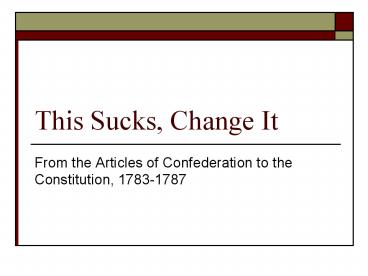This Sucks, Change It - PowerPoint PPT Presentation
1 / 23
Title: This Sucks, Change It
1
This Sucks, Change It
- From the Articles of Confederation to the
Constitution, 1783-1787
2
Articles of Confederation
- System of government that had arisen during
Revolution and continued after - Ad hoc creation
- Lots of problems
- No executive
- No judiciary
- No taxing power
- Change requires all thirteen to agree
- Theres always Rhode Island
3
Practical Problems of Independence
- Finances. There are none.
- Robert Morris and Bank of North America
- Killed by Rhode Island
- Right Modern Rhode Island Population Density
Map, Bureau of the Census, Department of Commerce
4
Practical Problems of Independence
- The army. Still mobilized and waiting to be
paid. - Morris and Alexander Hamilton
- Newburgh Conspiracy
- Right Alexander Hamilton, by Daniel Huntington
from John Trumbull, 1865
5
Practical Problems of Independence
- Debt is a problem. A growing problem.
- 11 million to 28 million
- States have their own debts
- National government running a deficit each year
6
Practical Problems of Independence
- Only tangible asset is land
- Disagreement about how to use this asset
- Disagreement about who should benefit
- Right Thomas Cole, The Oxbow, 1836
7
Northwest Ordinance (1787)
- Lands carved up into territories and opened to
settlement - Colonial relationship with central government
- 60,000 can petition for statehood
- Slavery banned north of the Ohio
8
Practical Problems of Independence
- Economic depression outside of the mercantilist
system. - Little hard currency to facilitate trade and
credit - British prices now higher
- Thirteen different trading policies toward UK
- States soon turn on one another
9
Practical Problems of the Revolution
- What was this all about anyway?
- Home rule and who rules at home.
- Democratic promise of declaration.
10
Conservative Elites Increasingly Besieged
- Massachusetts as an example
- Conservatives dominate state legislature because
of urban voting strength - Right Modern Photo of Old State House, Boston, MA
11
Massachusetts Troubles
- Want balanced budget
- Oppose paper currency and debt relief
- Balance the budget with taxes
- Land tax
- Poll tax
- Right State Seal of Massachusetts
12
Shayss Rebellion
- Daniel Shays leads western Massachusetts in
revolt - Attack Springfield arsenal, but dispersed in 1786
- Scares elites in Boston and elsewhere
13
Bringing Order to Chaos
- Early 1787, Congress calls for convention in
Philadelphia to revise Articles - People happy with Articles are suspicious
- Relief and enthusiasm from those who want change
- Meeting convenes in July and is known as
Constitutional Convention
14
Constitutional Convention
- Slow to get started
- States delay sending people OR
- Decided not to send anyone at all
- Once convened realize Articles a mess
- Modern Photo of Independence Hall, Philadelphia,
PA by Dan Smith
15
Constitutional Convention
- Agreed to go beyond their mandate
- Tight security and secrecy
- No formal written record
16
Constitutional Convention
- Main debates are over the question of
representation - Founders not democrats, they favor a republic
- Agreed with conventional wisdom about mixed
government to prevent tyranny - Intellectual descendants of Locke and Hobbes
17
Two main ideas, one compromise
- Virginia Plan
- Bicameral
- Based on population
- New Jersey Plan
- Unicameral
- Based on equal representation per state
- Connecticut Compromise
- Upper house equal representation
- Lower house by population
- Right Flag of Connecticut
18
So what is representation anyhow?
- White male government
- Constitution leaves voting requirements to states
- Landowning a common requirement
- Desire to have people of property more powerful
than common man - Slavery, though, an emerging wedge
19
Three-fifths Compromise
- North cries foul
- South threatens not to play ball
- Compromise reached
- Direct taxation of slave property
- Slaves counted toward representation
- Gives artificial power to the South
20
Creation of the Presidency
- Intellectual and practical conundrum
- Madison considerable pause
- Created presidency, but worried about its power
- Also limited power of people to choose Electoral
College
21
Creation of the Courts
- Almost an afterthought
- Not spelled out, though likely that English
conception of their role dominant among founders - Supreme Court, with Congress creating lesser ones
- Right United States Supreme Court, Washington, DC
22
Separation of Powers
- Mixed government again
- Also, Hobbes again
- Powers unique to branches and not exercised by
others - Powers unique even to houses of Congress
23
Checks and Balances
- Congress v. President
- President v. Congress
- Both against the courts
- Courts against the other two?
- Bill of Rights as a sticking/selling point































